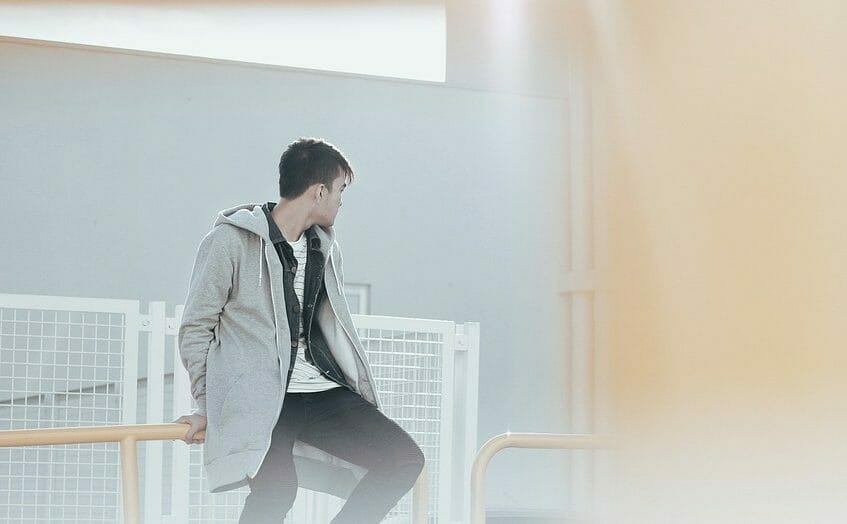
Many forms of therapy try to help the client overcome pain. One big source of pain starts during childhood, when kids, with their lack of life experience, feel that they are a disappointment to their parents. Here is the story of Simon, who believed he was the biggest loser in his parent’s eyes.
Simon was an angry and frustrated teenager when he came to sit with me on my life coaching deck. I read what he and his parents had written to me and felt frustrated to see how yet another whole family was a victim of circumstances. Parents’ love can be overwhelming sometimes and being unaware of feelings and lacking the ability to manage them sabotages the relationships at home.
Parents need courage to realize that they are the most powerful in this dysfunctional dynamic, but most of them feel helpless and send their kids to be “fixed”. A relationship with a child is a dance. Some parents do not understand that they need to lead.
Simon lived in a modern home with boundaries of thought. When I asked him about his dreams and desires, he looked at me like, “What on earth are you talking about? Future? What is it? I’m just trying to survive!” For those in “survival mode”, thinking about the future is a luxury.
You are probably asking yourself, “How come a beautiful, good looking, athletic, successful student with lots of friends (and a girlfriend) is in survival mode in a home with loving parents, who are still together and care about him enough to send him to a private school and to see a life coach?” This is what I asked myself at first.

Simon ticked all the boxes for success, but he was unhappy. He had no confidence and not enough positive beliefs to support him or help him enjoy his success. It did not take long to discover that in his mind, Simon’s parents thought of him as the biggest loser. I will emphasize that this was in Simon’s mind.
Some will argue with me and say, “Well, this is his problem, because obviously, no parent thinks of his/her child as the biggest loser”, but I say that it does not matter at all if they do or not. What matters is that in Simon’s perception, they do!
You see, all our interactions and beliefs about what others think of us are perception, not reality. We form this perception through experience and through neural-mirroring. We perceive hidden messages through body language, tone of voice and words that can be interpreted in different ways. Unfortunately, we interpret some of them in a negative way.
There was something that Simon’s parents did that made him think he was the biggest loser. As a child, he learned how to interpret things from his parents and they did not give him the tools to interpret their messages in a positive way.
I am not here to blame Simon’s parents, because blaming will not get us anywhere, and life coaching steers away from blame towards action. I worked with Simon on looking forward and not finding anyone to blame. My job was to help Simon expand his thinking from “My parents think I am the biggest loser” to “My parents think I am awesome and they love me”. I had to help him think he was awesome and find proof for it in his parents’ behavior towards him.
It was important to find out what things his parents said and did that had given him such a bad impression, so that we could find alternative explanations for them.

While talking to Simon, I discovered that his parents had a set idea of what he was going to be and do in life. They sent him a message that this was the only thing he could be and do or … he would be “a disappointment”.
As a result, Simon had a strong feeling of being “a disappointment”. Nothing he did was good enough, he could never please his parents, because “They know better than me”, “They will never let me do that” and “They will not approve …” He had so many such expressions that I had to change the conversation several times.
I asked him, “What would they do if you didn’t do what they expect of you?”
He was quiet for a while. I could see the pressure in his mind. He let out a sigh and said, “They will be … disappointed”.
Disappointment is abuse!
Many parents do not understand that disappointment is a form of abuse. It is a form of emotional violence meant to put pressure on the other person to do whatever we want.
It does not matter how nicely we present it and how much justification parents have to explain why they do it, it is abuse and causes lots of emotional damage.
Simon was 15 years old, so he was lucky. I regularly see grownup clients, some more than 50 years old, on my life coaching deck that still struggle with that sense of disappointment of one or both of their parents (“It was their educational tool”). I have been doing this work for 30 years and disappointment cuts so deep that it is one of the hardest hurts to deal with.
Simon was lucky, because he had the opportunity to remove this perception from his mind at an early age and develop positive interpretations of his parents’ messages.

First, I gave him permission to be whomever he wanted during our sessions and used his imagination to take him to a good place. I asked him, “Who would you be if you could be anything you wanted?”, “If you could do anything you wanted, what would you do?” and “If you knew you can never disappoint anyone, what would you do?”
Once an idea is in our mind, the brain does what it takes to make it reality. Research shows that imagining a good future affects our mind just like experiencing that good future would.
I had to set Simon free, at least in his mind, so he could explore options that the fear of disappointing his parents did not allow him to consider.
I first used this technique at the beginning of my education career and I have used many times it with my family. I remember that one year, my husband’s boss left and everyone was looking for a replacement. I said to him, “Why don’t you apply for the manager’s position? You have been talking about improvement ideas for a long time and now is your chance to put them to the test”.
For a while, Gal (my husband) explored the idea of applying. He had never been in a managerial position before and for a month, he talked about it and eventually applied for the job. He did not get it, but from that moment on, after considering himself a manager (albeit all in his head), he did not feel comfortable doing what he did before anymore and within a very short time, he applied for a manager’s position in another branch of the company and got it.
For Simon, it worked the same way. We spent some time talking about the ideal life, the ideal relationships at home, the ideal support for him. We even talked about the ideal support and understanding he could give his parents.
Within 2 months, his life changed completely.

At one stage, I asked him, “Do you know what your mom’s hobbies’ are?”, “How does she feel about her work?” and “Who are her best friends?” He did not reply, just shrugged his shoulders.
“Does your mom know who your best friends are?” I asked him and he said nothing, but he smiled.
“Do you ask your dad at dinnertime about his day?” He gave me an embarrassed smile and did not answer.
Some parents say to me that this is an opportunity to say something about how selfish teenagers are and how they only take and do not think they need to give back. Some parents never miss this opportunity to tell their teens off and prove that teens are not OK. I think that saying anything defeats the effectiveness of the insight.
One’s mind, once stretched by a new idea, never regains its original dimension
Oliver Wendell Holmes
I did not have to say anything to Simon. He said it to himself. Because he said it to himself, the understanding sank in and will stay with him. His mind used the new insight to adjust his belief system and it all happened in a second. From that moment on, his mind started to search for support for the new idea and belief. It will seek and it find!
If I said anything, his mind would have rejected it like the body rejects a foreign object.
A week after our session, I received a letter from his mom. She wrote:
Dearest Ronit,
I wanted to ask you what did you do to Simon and I know you won’t answer because you told me you wouldn’t.
He came home from your last session a different child. Jude brought him home and said he acted differently in the car. He didn’t share anything about the session. I was surprised. He is usually not so trusting of strange people. He came home smiling and was very quiet and at first, I was worried. His whole attitude had changed.
I picked him up from school yesterday and he asked me, “How was your day, mom?” I was shocked. I almost cried. I didn’t know if I should tell him that I’d had a bad day at work, because I had, or just be happy that he asked and pretend to encourage him to ask again.
I told him I’d had a challenging day and asked him about his day. We had a very nice conversation in the car. Later on, when Jude came home, we had a nice dinner and talked about how our life was like when we were teenagers. Simon was very surprised when I told him I wanted to be an art teacher, but ended up doing accounting, because my dad was an accountant.
This morning, when I dropped him off at school, he left the car and said, “I love you, mom”, and I drove to work crying.
Thank you Ronit!
Mandy
Relationship as a dance
Simon came for one more session 3 weeks later, and held himself differently. I even thought he looked taller (he was 15 years old and over 35cm/14″ taller than me). He smiled a lot and asked me if I talked to his parents, because they had changed since our last session. I told him his mom had written to me and we sent some emails to each other to schedule the session, which was true.
“Do you think they changed or did I?” Simon asked and I smiled.
“Yes”, I said, and we both smiled.
In the second and last session, I went with him over each part of his expectations of the ideal family relationship and he rated all of them higher than before. It took four weeks for his brain to shift his belief system from being the biggest loser to “I am a caring person” and starts a cycle that changed the way his parents treated him.

A relationship is like a dance. When one partner makes a move, the other one has to adapt and make a matching move. Whatever happens to one, affects the other. Just like dancing, no one has to force the other to do anything. Changes can be gentle and done in coordination and with respect towards each other’s desires, preferences and challenges. With force and without that subtlety, it is a battle, not a dance.
In an ideal parent-teen relationship, the parents should “lead the dance”.
Why?
Because they have more experience and they are in charge.
Sadly, many parents cannot lead this “dance”, because they lack some emotional stamina and use old-fashioned methods, like disappointment, as an educational tool.
Simon’s story is proof that sometimes, teens can lead the change, and make huge shifts in the family dynamic with very small movements.

At the end of the session, I told him that a teenager can make such a shift in his family, in such a short time, and gain so much confidence from it, is inspiring, not a loser. We talked about the definition of a loser, until he said, “There is no such thing as a loser. Some people are scared, can’t or don’t know how, but that does not make them losers”.
I thought his new beliefs about being a loser were going to support him in his life better than the old ones.
When I escorted Simon to the car, where his dad was waiting for him, he gave me a strong hug, said, “Thank you, Ronit”, and got into the car. My heart overflowed with joy. One more teenager took control of the dance. I could not rub the smile off my face for a long time.
Cheers to youth!
Ronit
This post is part of the series From the Life Coaching Deck:
- Amazing Awakened Spirit in a Beautiful Teenager
- If-then Parenting Style
- How to Help Your Kid Drive
- The Meaning of Life
- Hyperactive Kids
- Secret Demons
- Making Money Addiction
- Art Fights Depression
- Trust Your Healing Powers
- Troublemaker
- The Want Muscle
- Abusive Parenting Cycle
- Learning to Want
- Don’t Put Labels on Kids
- Stop Making More Money
- There Are No Hopeless Teens
- How to Have a Good Day Everyday
- No More Disappointment: The Biggest Loser Leads the Dance
- Choosing the Right Career Path for Your Kids











